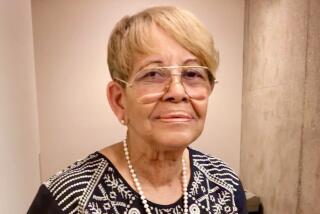Ella Collins; Activist Raised Half Brother, Malcolm X
- Share via
BOSTON — Ella L. Collins, a civil rights activist and self-made businesswoman whom her half brother Malcolm X called “the first really proud black woman I had ever seen,” has died at age 82.
Collins, who raised Malcolm and took over his black Muslim splinter group after his assassination, died Aug 3. She had lived in a nursing home for years after suffering several strokes and diabetes, which cost her both legs.
After Malcolm was shot to death in February 1965 while giving a speech to 300 followers in New York City, Collins drove to New York to identify his body. She took control of the Organization of Afro-American Unity, the group Malcolm founded after his split in 1964 with Nation of Islam founder Elijah Muhammad.
“[Malcolm] was at the point where he could become stronger than ever. I could see Malcolm becoming the greatest black man in the history of the world,” said Collins, who gave Malcolm money for his pilgrimage to Mecca.
In 1970, when she came to Los Angeles to organize a chapter of their organization, she and several colleagues were arrested purportedly on suspicion of possessing narcotics. She was released after the district attorney’s office refused to issue a complaint.
In Boston, she organized the Sarah A. Little School of Preparatory Arts, where children were taught Arabic, Swahili, French and Spanish.
Collins and Malcolm were children of the Rev. Earl Little, a Baptist minister and organizer for Marcus Garvey’s Universal Negro Improvement Assn., which urged blacks to return to Africa.
Malcolm’s mother, Louise, suffered a nervous breakdown and was committed to a state mental hospital after Little died in a Lansing, Mich., trolley accident that some blacks believed was a racially motivated killing.
Collins went to Lansing in 1940 and brought Malcolm home to Boston, taking official custody of her half brother when he finished eighth grade.
“She was the first really proud black woman I had ever seen in my life,” Malcolm said in “The Autobiography of Malcolm X.” “No physical move in my life has been more pivotal or profound in its repercussions.”
More to Read
Sign up for Essential California
The most important California stories and recommendations in your inbox every morning.
You may occasionally receive promotional content from the Los Angeles Times.










